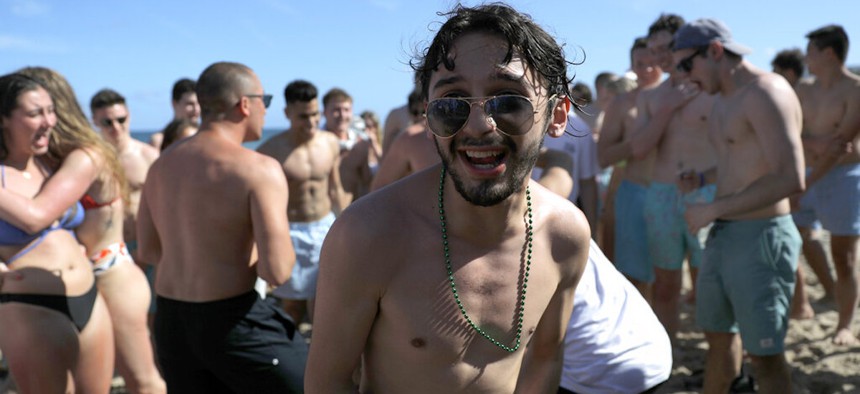Florida Officials to Spring Breakers: Please Try to Not Spread Covid Everywhere

College age spring break students party on the beach, Tuesday, March 17, 2020, in Pompano Beach, Fla. Associated Press
City and county leaders in Florida, prohibited from enforcing local mask mandates, are relying largely on public messaging to keep visitors in line.
Local officials in Florida are pleading with spring break revelers to wear masks and to adhere to social distancing and other public health guidelines to prevent a resurgence of Covid-19 cases.
“We’ve come a long way as a community in slowing the spread of the virus,” Orlando Mayor Buddy Dyer tweeted on Saturday. “As you enjoy our city and our wonderful weather this weekend, continue your pandemic precautions.”
Covid-19 cases have slowed nationally and in Florida, but the state is a hotbed for several emerging, more-contagious variants of the virus. There are no formal travel restrictions in place for domestic flights in the U.S., but public health officials continue to urge caution.
“Don’t travel,” Dr. Rochelle Walensky, director of the Centers for Disease Control and Prevention, said during a JAMA livestream last month. “We really, really would advocate for not traveling right now.”
But air travel is spiking despite those warnings. More than 1.3 million people were screened Friday at airports nationwide, according to federal data—the highest number since last March.
Florida, a traditional spring break destination for high school and college students, may be particularly attractive to travelers due to the lack of statewide restrictions in place.
Gov. Ron DeSantis in September opened the state’s public beaches and lifted capacity limits on restaurants, bars, nightclubs and other venues. Florida has no statewide mask mandate, and while city and county leaders are permitted to “maintain or pass” local ordinances, they’re prohibited from enforcing them via fines or other penalties.
That leaves local officials with few options for enforcing public health guidelines for tourists, though many popular vacation destinations have tried. The city council in Panama City Beach, for example, restricted the size of crowds at beach events for the month of March and closed a section of the beach for the first half of April.
“Based on social media traffic regarding spring break for this year, police believe a lot of high school students will be in this area in early April,” the city said in a news release.
Ft. Lauderdale Mayor Dean Trantalis appealed directly to tourists in a prerecorded video message, telling travelers they are “the first line of prevention when it comes to minimizing the spread of the virus” and encouraging business owners to adhere to CDC guidelines.
“In light of the current pandemic, we want to make sure that your time visiting Ft. Lauderdale is enjoyable, memorable and safe,” he said.
Officials in Miami Beach placed capacity limits on “high-traffic public beaches” and banned coolers, tents, tables and inflatables from beaches. The city also increased staffing for police and other public safety officials and launched a spring break-specific website that encourages visitors to “vacation responsibly or be arrested.”
Despite those precautions, spring break was off to a raucous start in the city. Police used pepper spray and pepper balls Friday to break up a “disorderly crowd,” resulting in injuries to two officers who were taken to the hospital, the Miami Beach Police Department said on Twitter. About 100 people were arrested over the weekend, including 30 on Saturday night alone.
“We’re seeing too much spring break activity,” Miami Beach Mayor Dan Gelber told CNN on Saturday. “We’ve got a problem with too many people coming here to let loose.”
Kate Elizabeth Queram is a staff correspondent for Route Fifty and is based in Washington, D.C.
NEXT STORY: The Boom in Out-of-State Telehealth Threatens In-State Providers





